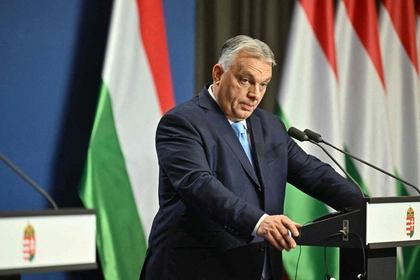Hungarian Prime Minister Viktor Orban visited Kyiv and called for a swift ceasefire to facilitate peace talks after meeting with Ukrainian President Volodymyr Zelensky. Orban, known for his pro-Russian stance, suggested a time-bound ceasefire to speed up negotiations.
“I asked the president to consider whether... a quick ceasefire could speed up the peace talks,” the Hungarian leader told a press conference alongside Zelensky, adding that the ceasefire he envisions would be time-bound.
JOIN US ON TELEGRAM
Follow our coverage of the war on the @Kyivpost_official.
Viktor Orban, the EU’s most pro-Russian leader, arrived in Kyiv on Tuesday, July 2. This visit, his first to Ukraine since the full-scale invasion over two years ago, coincides with Hungary assuming the rotating EU presidency.
Zelensky, in turn, told Orban that Ukraine needs a “just peace” after more than two years of fighting Russia’s full-scale invasion.
“We appreciate that your visit takes place right after the start of the Hungarian Presidency of the European Union. This clearly indicates our common European priorities, of how important it is to bring a just peace to Ukraine,” the Ukrainian leader said at a press conference.
He added that it was important for Europe to maintain military support for Ukraine as the army struggles to resist Russian attacks.
“It is also very important for all of us in Europe that Europe’s support for Ukraine remains sufficient, including our defense against Russian terror,” Zelensky said during a press briefing with Hungarian leader Viktor Orban.

ISW Russian Offensive Campaign Assessment, January 21, 2025
During the press conference, Orban expressed a desire to sign a global cooperation agreement with Ukraine and offered support for modernizing Ukraine’s economy.
“We want to establish relations between our countries; we want to sign a global cooperation agreement with Ukraine, similar to the agreements we have with other Hungarian neighbors,” Orban said.
"I asked President #Zelensky to consider whether it's possible to make a pause, cease fire, and then start negotiations," Hungarian Prime Minister Viktor #Orban said during a joint press conference with Volodymyr Zelensky in #Kyiv, as reported by RBC-Ukraine.
— KyivPost (@KyivPost) July 2, 2024
In addition, Zelensky announced an agreement to open the first school for Ukrainian-speaking children in Hungary, which Hungary will also fund.
“We will open as many Ukrainian schools as needed. It is important for us that Ukrainians feel at home in Hungary,” Orban said
The Hungarian prime minister is the only EU leader who has maintained close ties with Moscow since the full-scale invasion.
He has also criticized sanctions against Russia and opposes Ukraine’s EU ambitions, though he has stopped short of blocking accession talks.
Orban refused to send arms to Kyiv and has called for a ceasefire and peace negotiations, saying he was “fighting for peace alone” in the EU.
Opponents
As reported by AFP, relations between Orban and Zelensky have been frosty since the start of the war.
After winning re-election in April 2022 Orban said the Ukraine leader was an “opponent” that he had managed to defeat in the campaign.
Zelensky had personally called out Orban for his lack of support to Kyiv in the days after Russia invaded -- a position that has only appeared to harden with the war now in its third year.
In December, Zelensky sought out the Hungarian leader at the inauguration of Argentine President Javier Milei for what he called a “frank” conversation.
Videos circulated online showing the pair locked in a tense exchange, with Orban standing with his back to the wall and Zelensky in front of him.
The pair were again filmed in a short, animated exchange, last week on the sidelines of an EU Council meeting in Brussels.
Hungary wields outsize influence over the West’s support for Ukraine given its membership of both the EU and NATO.
That gives it the ability to thwart, delay, water-down or outright block initiatives and funding to support Kyiv.
After a phone call in May, Zelensky said: “Hungary’s position is important to us when it comes to bringing peace and common regional security closer.”
Negotiations over a substantive face-to-face meeting between the pair have been in the works for months, according to statements by Ukrainian officials.
Western leaders have paid regular high-profile trips to Ukraine throughout the war in a bid to show support for their fight against Russia.
Tensions between Kyiv and Budapest pre-date the Russian invasion, with Hungary angry at Ukraine’s language policies.
More than 100,000 ethnic Hungarians live in Ukraine, most in the western Zakarpattia region, part of Hungary until the end of World War I.
You can also highlight the text and press Ctrl + Enter










